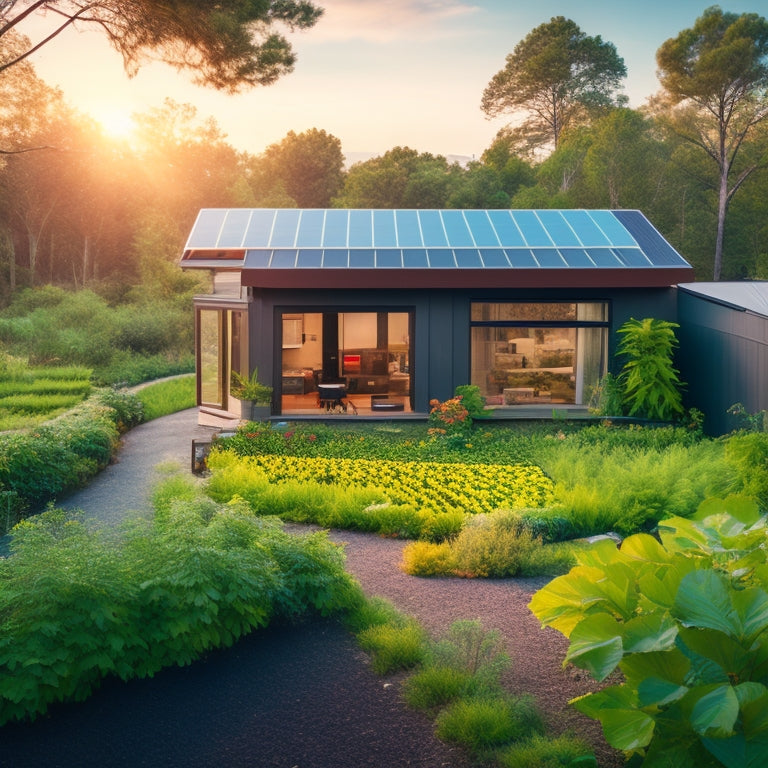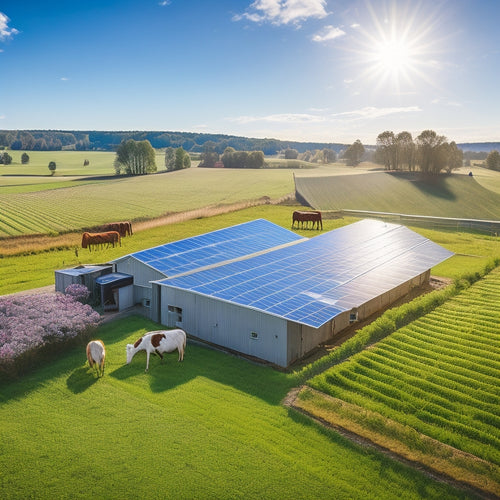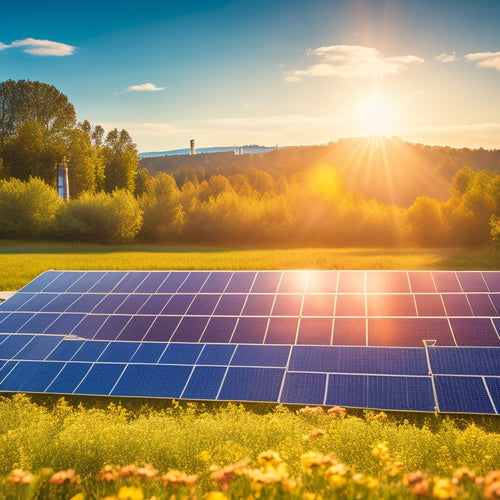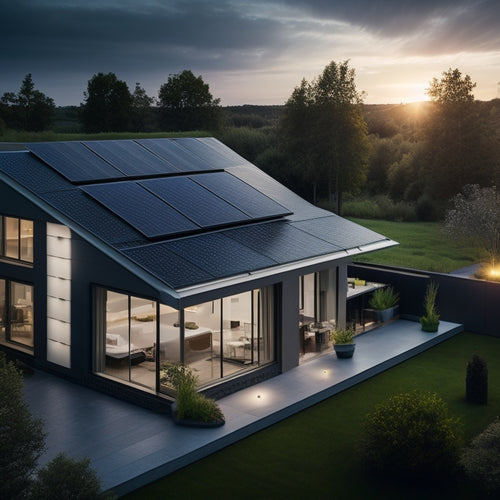
Off Grid Home Independence Made Simple
Share
You're taking a significant step towards achieving off-grid home independence by understanding that a well-designed energy system is vital for living self-sufficiently. To get started, you'll need to assess your daily energy usage patterns to determine your power requirements, considering energy-efficient appliances, insulation, and conservation strategies. Next, choose the right solar panels and energy storage systems, ensuring accurate power calculations to minimize energy waste. A thorough site assessment and proper installation are also essential. By following these steps and fine-tuning your system over time, you'll be well on your way to achieving the independence you're looking for - and there's still more to investigate in your expedition to off-grid living.
Key Takeaways
- Assess daily energy usage patterns to determine power requirements and optimize system design for off-grid independence.
- Choose high-efficiency solar panels that fit your budget and ensure proper installation for maximum energy production.
- Plan and maintain an adequate energy storage system, including regular battery checks and equalization charges, to ensure reliable power supply.
- Utilize energy monitoring systems to track production, consumption, and storage metrics, and make data-driven adjustments for optimal performance.
- Implement energy conservation strategies, such as using energy-efficient appliances and enhanced insulation, to minimize energy waste and maximize independence.
Understanding Off Grid Energy Needs
Every off-grid home requires a customized energy system to meet its unique power demands, and understanding these energy needs is vital for achieving independence from the grid.
You'll need to assess your energy usage patterns to determine how much power you require. Reflect on your daily energy consumption, including lighting, heating, cooling, and appliance usage.
Effective power management and energy conservation strategies, like using energy-efficient appliances and enhancing your home's insulation, are also significant.
When selecting a DIY solar power system, it's important to evaluate high-efficiency panels and durable mounting systems to guarantee peak performance.
Choosing the Right Solar Panels
When selecting solar panels for your off-grid home, you'll want to evaluate two critical factors: panel efficiency and budget-friendliness.
High-efficiency panels may seem expensive, but they can provide more power per hour of sunlight, making them a worthwhile investment in the long run.
Additionally, choosing the right solar panels can lead to long-term cost savings and reduce your carbon footprint.
Panel Efficiency Matters
Frequently, homeowners investing in off-grid home independence overlook a crucial aspect of their solar panel system: panel efficiency. You need to evaluate the type of panel that suits your energy generation needs.
Monocrystalline and polycrystalline panels are popular options, but thin-film panels provide a more environmentally friendly choice. Efficiency ratings vary, so look for high-performance metrics, such as high wattage per hour and low temperature coefficients.
Installation tips include orienting panels at the ideal angle and ensuring minimal shading. When comparing costs, assess the long-term benefits of higher-efficiency panels.
In a grid comparison, high-efficiency panels can provide more energy per unit area, reducing your environmental impact. By choosing the right panel, you'll maximize your energy generation and move closer to off-grid home independence.
Budget-Friendly Options
You've invested in off-grid home independence, but now it's time to reflect on your budget. Choosing the right solar panels can be a significant expense, but there are budget-friendly options to evaluate.
Opt for DIY solutions, such as purchasing panels in bulk or shopping during sales. Implement cost-saving strategies like energy-efficient appliances and lighting to reduce your energy needs.
Take advantage of government incentives, like tax credits, to offset the cost of your alternative energy system. Additionally, explore community support programs that offer discounts on renewable resources.
Assessing Your Energy Storage Needs
You'll need to calculate your daily energy load to determine the required capacity of your energy storage system. This means identifying the total watt-hours your home consumes daily, considering factors like appliances, lighting, and heating/cooling.
Accurate power calculations and battery capacity assessments minimize energy waste, as seen in power calculations and battery capacity. By doing so, you'll be able to choose the right battery type and size your system for future growth, ensuring a reliable and efficient off-grid energy supply.
Calculate Daily Energy Load
Accurate assessment of your daily energy load is the linchpin of off-grid home independence, as it directly impacts the size and cost of your energy storage system.
To calculate your daily energy load, you'll need to evaluate your energy consumption patterns, including peak usage hours and appliance efficiency. Seasonal variations in your energy usage, such as increased heating or cooling demands, must also be factored in.
Your lifestyle impact, including your daily routines and habits, will influence your energy usage forecasting. Conducting an energy audit will help you identify areas of inefficiency and opportunities for improvement.
Choose Battery Type Wisely
With your daily energy load calculated, it's time to select the right energy storage system to meet your off-grid home's power needs. This decision is vital, as it directly impacts your system's performance, reliability, and cost-effectiveness.
When choosing a battery type, consider the following key factors:
-
Lithium advantages: Higher energy density, longer lifespan, and faster charging rates make lithium batteries a popular choice for off-grid systems.
-
Lead acid drawbacks: Lower energy density, shorter lifespan, and lower charging efficiency make lead acid batteries less desirable, but still a cost-effective option.
-
Battery lifespan: Assess the total cost of ownership, including replacement costs and maintenance tips.
-
Solar compatibility: Verify the battery type is compatible with your solar panel array and inverter selection.
-
Cost comparison: Weigh the upfront costs against long-term savings and the overall value of each battery type.
Sizing for Future Growth
When designing an off-grid energy system, it's essential to plan for future growth and expansion.
You'll want to guarantee your energy storage system can scale to meet increasing energy demands. To do this, consider your current energy needs and anticipate how they might change over time.
Will you be adding more appliances or family members? Do you plan to expand your living space or add a new outbuilding?
By thinking ahead, you can size your energy storage system to accommodate future expansion. This is where energy scalability comes in – designing a system that can adapt to changing energy needs.
Designing an Efficient Solar System
You're about to commence on the most critical stage of your off-grid home independence journey: designing an efficient solar system. This is where the rubber meets the road, and careful planning is essential to guarantee your system meets your energy needs.
To get started, consider the following key factors:
-
Maximize solar panel orientation: Confirm your panels are positioned to enhance energy harvesting, factoring in your location's latitude, shading, and seasonal variations.
-
Understand your energy consumption patterns: Analyze your daily energy usage to determine the required system size and configuration.
-
Select the right solar panel type: Choose panels with high efficiency ratings and durability to guarantee peak performance.
-
Plan for energy storage: Determine your battery bank size and type to store excess energy for later use.
-
Consider system monitoring and maintenance: Invest in a monitoring system to track performance and schedule regular maintenance to guarantee peak operation.
Installing Solar Panels Off Grid
Beyond the planning phase, installing solar panels off-grid requires careful attention to detail to guarantee a safe and efficient setup.
You'll need to choose the right solar panel types for your off-grid system, considering factors like power output, durability, and compatibility with your system's components.
When it comes to installation techniques, you have two main options: roof-mounted or ground-mounted systems. Roof-mounted systems are ideal for homes with existing roof structures, while ground-mounted systems offer more flexibility regarding panel orientation and cleaning.
Ascertain your installation meets local building codes and safety standards. Properly secure your panels to withstand environmental factors like wind and snow loads.
Maintaining Your Solar Energy System
As your off-grid solar energy system hums along, it's essential to prioritize regular maintenance to guarantee peak performance and extend its lifespan.
To confirm your system operates smoothly, follow these vital solar maintenance tips:
-
Check your inverter's display regularly to verify it's functioning correctly and performing within its specified parameters.
-
Inspect your solar panels for dirt, debris, or shading, and clean them as needed to maintain peak energy production.
-
Verify that all electrical connections are secure and not overheating.
-
Check your battery bank's state of charge and perform equalization charges as recommended by the manufacturer.
-
Schedule annual professional inspections to address any potential issues before they become major problems.
Monitoring Your Energy Production
Reliability is the cornerstone of an off-grid home's energy independence, and monitoring your energy production is vital to achieving it.
You'll want to keep a close eye on your system's performance to guarantee it's producing the energy you need. Energy monitoring systems provide real-time data on your energy production, consumption, and storage.
With this information, you can identify areas for improvement and make adjustments to optimize your system's performance. Performance tracking is essential in identifying potential issues before they become major problems.
Frequently Asked Questions
Can I Connect My Off-Grid System to the Grid in the Future?
You can design your off-grid system to accommodate future grid tie options, allowing you to seamlessly connect to the grid if needed; incorporating modular components enables easy future upgrades, providing flexibility for your developing energy needs.
Are There Any Building Codes or Permits I Need to Obtain?
As you maneuver through the regulatory maze, you'll find zoning regulations and permit requirements are the gatekeepers to your off-grid dreams; research local ordinances to guarantee compliance, and don't assume anything - verify everything to avoid costly surprises.
How Do I Deal With Shading From Trees or Other Obstructions?
When dealing with shading from trees or obstructions, you'll need to contemplate tree trimming or relocating panels to optimize energy output. Investigate shading solutions like solar panel tilt adjustment, tracker systems, or bifacial panels to minimize energy loss.
Can I Use Solar Power for My Water Well or Septic System?
You're not just dipping your toes in off-grid living, you're diving headfirst! Yes, you can utilize solar power for your water well and septic system, using solar well pumps and septic energy systems to reduce your reliance on grid electricity.
Will an Off-Grid System Increase My Property's Resale Value?
You'll likely enhance your property's resale value by investing in an off-grid system, as it's considered a desirable property enhancement, increasing your home's appeal and attractiveness to potential buyers who value energy independence and sustainability.
Related Posts
-

What Do I Need to Know About Farm Solar Panels
When considering farm solar panels, you need to assess costs, benefits, and technical specifics. Initial investment c...
-

Advantages of Solar Generating Systems Over Traditional Energy
Solar generating systems provide several key advantages over traditional energy sources. You'll experience lower long...
-

Home Solar Battery
You're opting for a home solar battery that allows you to utilize the power of the sun during the day and use it at n...


